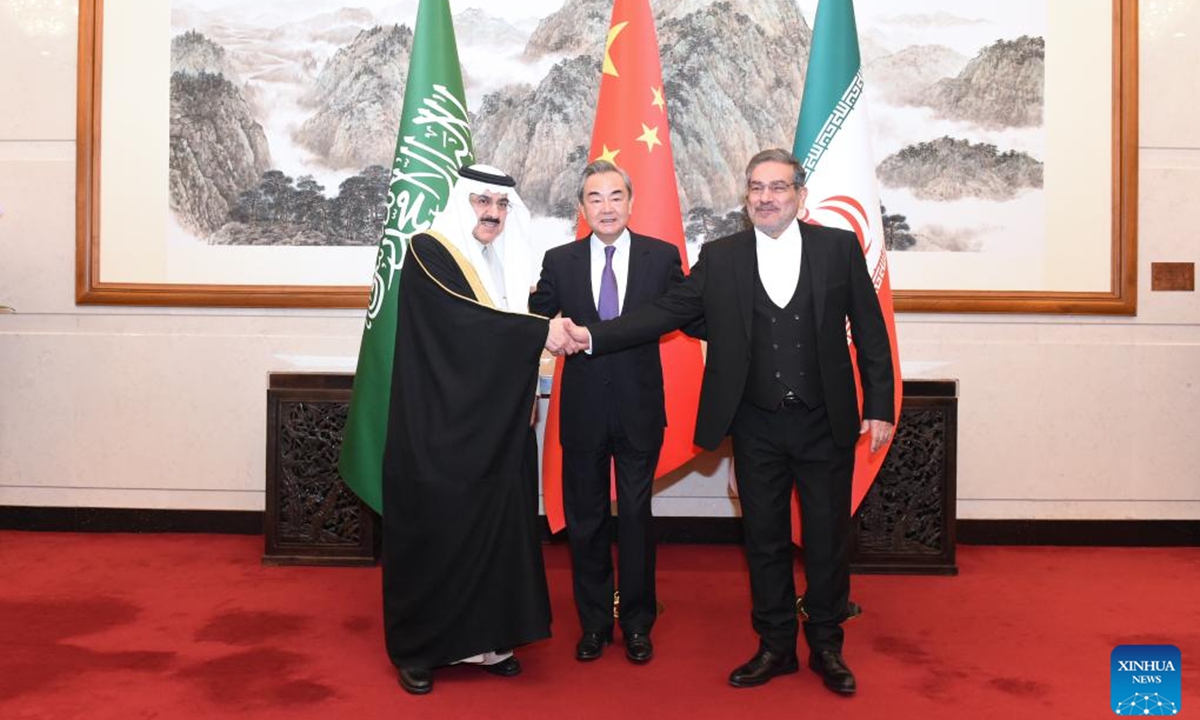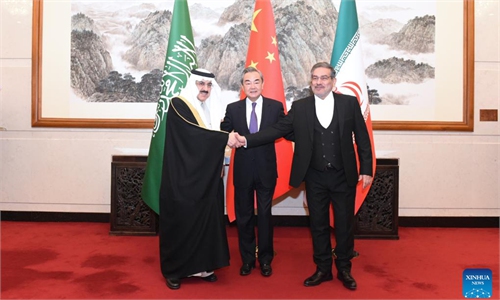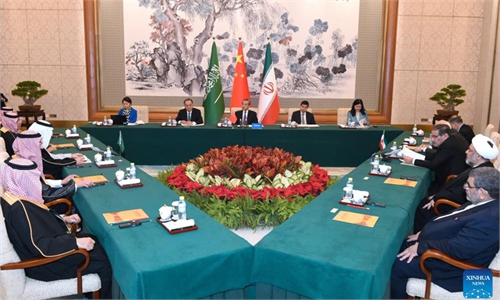
Wang Yi (C), a member of the Political Bureau of the Communist Party of China (CPC) Central Committee and director of the Office of the Foreign Affairs Commission of the CPC Central Committee, attends a closing meeting of the talks between the Saudi delegation led by Musaad bin Mohammed Al-Aiban (L), Saudi Arabia's Minister of State, Member of the Council of Ministers and National Security Advisor, and Iranian delegation led by Admiral Ali Shamkhani (R), Secretary of the Supreme National Security Council of Iran, in Beijing, capital of China, March 10, 2023. (Xinhua/Luo Xiaoguang)
One week after the announcement of the Joint Trilateral Statement by the People's Republic of China, the Kingdom of Saudi Arabia, and the Islamic Republic of Iran, the resulting"ripple effect" from the big deal is still expanding. The historic reconciliation between Saudi Arabia and Iran, promoted by China, will trigger a positive "domino effect," strengthening the momentum of dialogue, the easing of tensions, the trend of reconciliation, as well as the pace of cooperation in the Middle East. It indicates that China's Middle Eastern diplomacy has opened up a new chapter and may even result in some marked changes in the Middle East's situation. However, it is still difficult to alter the framework of historical relationships in the region.The normalization of ties between Saudi Arabia and Iran will undoubtedly activate changes in hot-button issues related to the long-standing Saudi-Iran feud, leading to a new pattern in Middle Eastern politics.
However, from a broader historical perspective, the geopolitical contradictions within the Middle East are complex and deep-rooted. Structural conflicts may not be resolved overnight. Similarly, major powers continue to have profound and complicated influence in the region, which won't be fundamentally, strategically, or comprehensively restructured permanently.
In 2016, Saudi Arabia and Iran cut their diplomatic ties. At the core of their conflict is the struggle for regional leadership, sphere of influence, and a political fight with their mixed secular and religious backgrounds.
Looking back historically reveals that their discord began with the Iranian Revolution in 1979. The two Islamic powers, who are close neighbors as well, formed two political and social systems, two religious systems and religious discourses, two diplomatic policies, and two approaches to international relations with significant differences and sharp antagonism toward each other. Gradually, their ties evolved into a "zero-sum" game.
From an even longer historical perspective, the Saudi-Iran strife stemmed from a complex and millennia-old legacy of confrontation and conflict between the Arab and Persian nations, the struggle for the legal status between Sunni and Shia Islam, the fight over inheritance, development, and dominant rights within the Islamic civilization, territorial disputes, as well as the struggle for power, diplomatic discourse, and regional influence.
With the historical reconciliation between Saudi Arabia and Iran, and the rapid resumption of their diplomatic relations, regional hot spots that have been created or stimulated by the long-term struggle between the two sides may also reach multiple breakthroughs. That being said, the cultural, religious, national, and even psychological factors that caused all the ups and downs in their relationship have not been fundamentally eliminated.
In recent years, Chinese diplomacy in the Middle East has shown its vision and wisdom and thus seen breakthroughs. However, it must be soberly recognized that the coexistence of stability and chaos is the basic feature and pattern of political development in the Middle East. The reconciliation between Saudi Arabia and Iran conforms to the trend of the times.
The basic pattern of the Middle East's numerous contradictions will not change immediately, nor will it fundamentally transform in the future. The structure of great power relations will not be completely rewritten any time soon. The US still has comprehensive influence in the region, while Russia has strong geopolitical leverage and military capabilities. Europe and Japan also have a powerful cultural influence through historical and geographical accumulation and long-term large-scale capital investment. China's diplomacy as a major power is just getting started.
The author is the dean of the Institute for Studies on the Mediterranean Rim at Zhejiang International Studies University. opinion@globaltimes.com.cn


